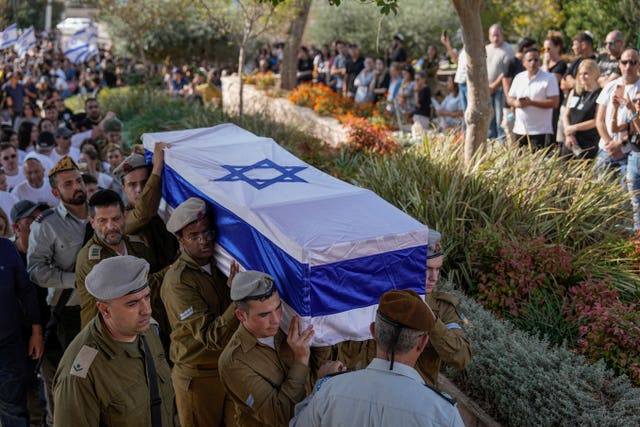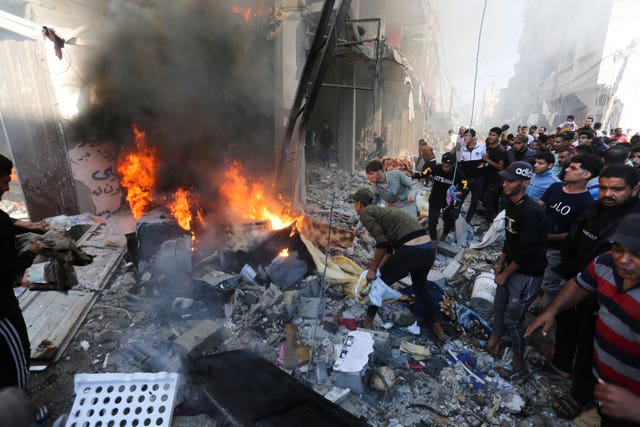The United Nations has been forced to stop deliveries of food and other supplies to Gaza and warned of possible widespread starvation after internet and telephone services collapsed in the besieged enclave thanks to a lack of fuel.
The communications blackout, now in its second day, largely cuts off Gaza’s 2.3 million people from one another and the outside world – and paralyses the coordination of aid, which humanitarian groups were already struggling to deliver because of the fuel shortage.
With no immediate prospect for Israel allowing in more fuel, it is unclear how long the situation will continue.
Ms Touma told the Associated Press: “An extended blackout means an extended suspension of our humanitarian operations in the Gaza Strip.”
Israeli forces, meanwhile, have signalled they could expand their offensive towards Gaza’s south even while pressing operations in the north.
People in the?#GazaStrip were completely isolated again last night in the fourth communications blackout during this war.
The communications network in #Gaza is down because there is NO fuel.
Gazans are completely cut off from their loved ones and the rest of the world. pic.twitter.com/TweVYhCOMj
— UNRWA (@UNRWA) November 17, 2023
Troops have been searching the territory’s biggest hospital for traces of a Hamas command centre which the military alleges is located under the building.
They have shown what they said were a tunnel entrance and weapons found inside the compound but not yet any evidence of the command centre, which Hamas and staff at Gaza City’s Shifa Hospital deny has existed.
The war, now in its sixth week, was triggered by Hamas’ October 7 attack in southern Israel, in which the militants killed more than 1,200 people, mostly civilians, and captured some 240 men, women and children.
On Friday, the military said it found the body of another hostage, identifying her as Cpl Noa Marciano.

More than 11,400 Palestinians have been killed in the war, two-thirds of them women and minors, according to Palestinian health authorities.
Another 2,700 have been reported missing, believed buried under rubble. The count does not differentiate between civilians and militants, and Israel says it has killed thousands of militants.
Speaking from Shifa Hospital on Friday, Dr Ahmad Mukhalalti told Al-Jazeera television that there was no electricity to run ventilators to provide ICU patients with oxygen, and that of the 36 infants there, most are suffering from severe diarrhoea because there is no clean water to give them.
#Gaza’s communication services shut down due to the depletion of fuel used for generators.
This disruption is impacting humanitarian operations, hindering desperately needed aid efforts.
We urgently need fuel to deliver life-saving assistance.
— UN Humanitarian (@UNOCHA) November 17, 2023
He added that Israeli troops, who stormed into the hospital on Wednesday, had brought food and bottled water, but that it had not been enough for the number of people in the hospital.
The health ministry in Hamas-run Gaza said the troops searched underground levels of the hospital on Thursday and detained technicians who run its equipment.
Israel faces pressure to prove its claim that Hamas set up its main command centre in and under the hospital, which has multiple buildings over an area of several city blocks.
US officials said they have intelligence to support the claims.

If the assault moves into the south, it is not clear where people would go, as Egypt refuses to allow a mass transfer onto its soil.
The Israeli military has called on people to move to a “safe zone” in Mawasi, a town on the Mediterranean coast a few square miles in size.
The heads of 18 UN agencies and international charities on Thursday rejected that proposal and called for a ceasefire and unimpeded entry of humanitarian aid and fuel.
As the war continues to inflame tensions elsewhere, Israeli troops clashed with Palestinian gunmen in Jenin in the occupied West Bank, killing at least three Palestinians. The fighting broke out late on Thursday during an Israeli raid.
Israel’s military said five militants were killed. The Palestinian health ministry said three people died.
The militant Islamic Jihad group claimed the three dead as members and identified one as a local commander.






